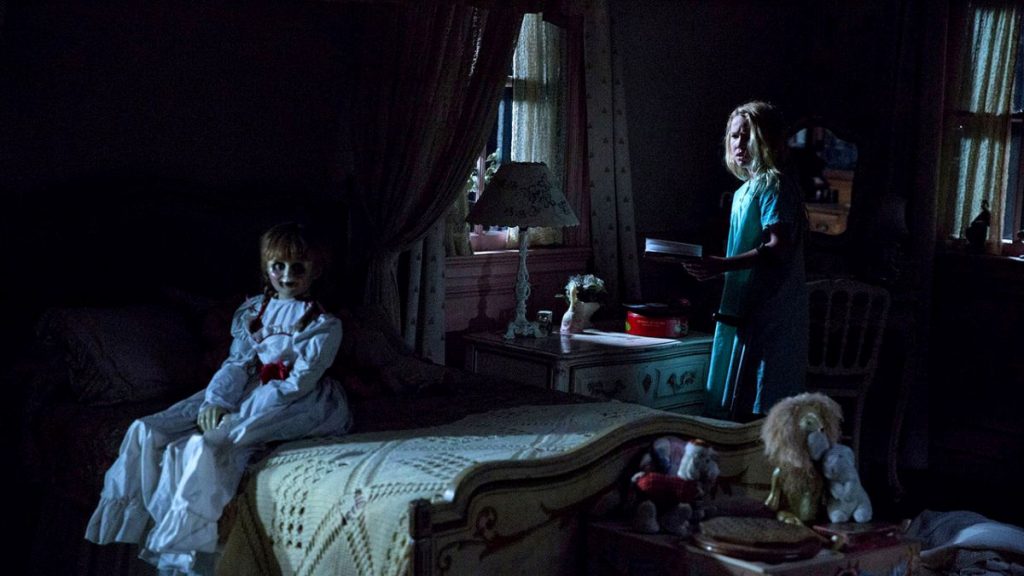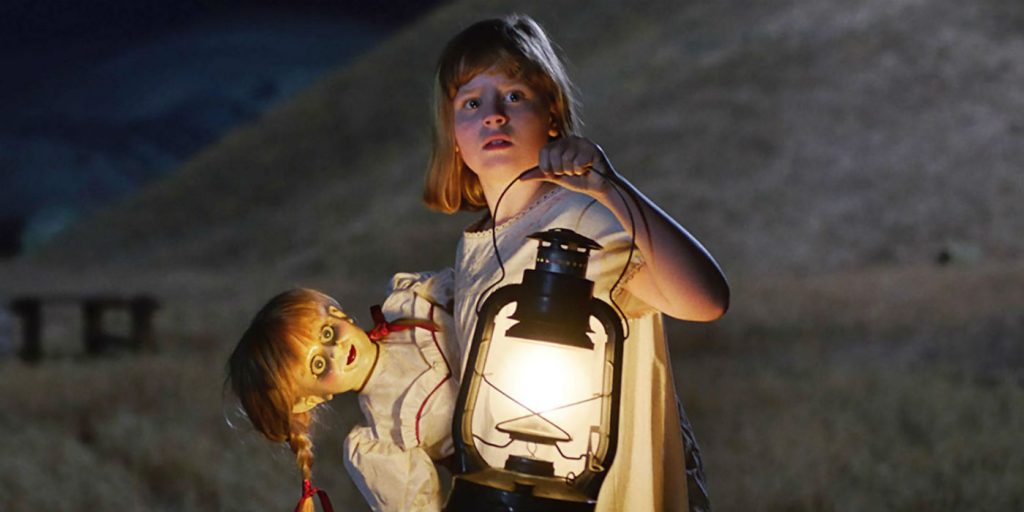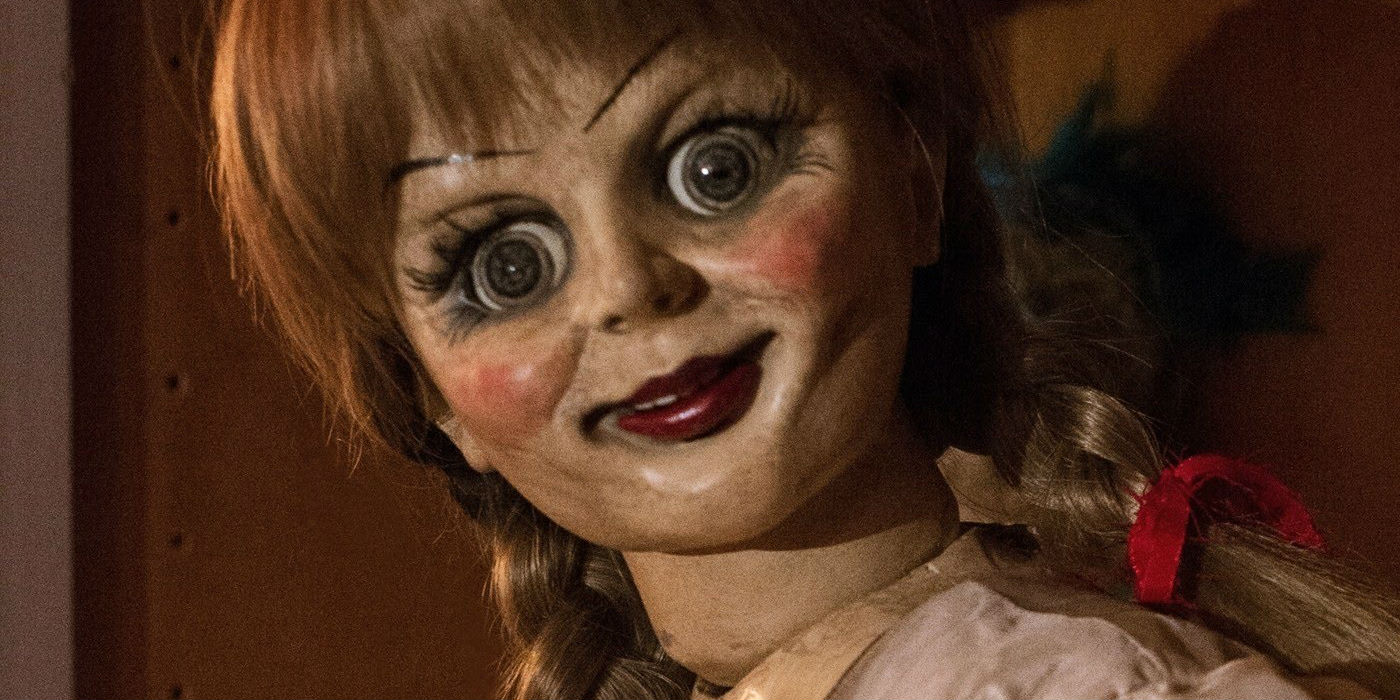If I’m doing the math correctly, Annabelle: Creation begins in 1945. I back into that year because Annabelle takes place in 1969, 12 years after the events of the new prequel, which take place mostly 12 years after the death of young Annabelle “Bee” Mullins (Samara Lee). I’m more concerned, though, with another number: 109. That’s the movie’s running time. Subtract 12 from that, and then 12 more… 85 minutes is what its running time should have been.
Closer to an hour and a half than to two hours, Annabelle: Creation
would have told a tighter story. As it is, there’s too much time to contemplate its inconsistencies. For example, how can the ghost of Annabelle/the doll/the demon (to be honest, I’m not sure what or whom is the real force of evil here) be in more than one place at the same time; or, where are the other characters while another one is being tormented by this force of evil?
The deliberate pace is probably intended to build scenes of suspense that explode into pure terror. While director David F. Sandberg (Lights Out) demonstrates some interesting camera movements, they aren’t related to the thrills. Instead, I was completely aware of the mechanics being used to generate a jump scare. Perhaps trying to fool us, many jumps never came. When they did, they didn’t work. This is an area where more judicious editing would have helped. Annabelle: Creation begins with promise. Dollmaker Samuel Mullins (Anthony LaPaglia) puts the finishing touches on the first doll in a limited series, hand-numbers it and places it in a wooden box. We learn at church that he has an entire order of dolls ready for a local shop owner to pick up the next day. Tragedy intervenes, though, after a shocking accident, and we jump to 12 years later when Mullins and his wife, Esther (Miranda Otto) now live alone and have opened their home to become an orphanage for six young women and Sister Charlotte (Stephanie Sigman).
Annabelle: Creation begins with promise. Dollmaker Samuel Mullins (Anthony LaPaglia) puts the finishing touches on the first doll in a limited series, hand-numbers it and places it in a wooden box. We learn at church that he has an entire order of dolls ready for a local shop owner to pick up the next day. Tragedy intervenes, though, after a shocking accident, and we jump to 12 years later when Mullins and his wife, Esther (Miranda Otto) now live alone and have opened their home to become an orphanage for six young women and Sister Charlotte (Stephanie Sigman).
Esther is confined to her bedroom, ringing a bell whenever she needs something. Although unoriginal, this would have been a more interesting idea for an entire movie. The children spend plenty of time wondering what’s behind her closed door, thinking she stalks them at night. In fact, they pay more attention to what’s happening downstairs than they do to what’s happening upstairs behind the locked door of Annabelle’s old bedroom.
That is, except for Janice (Talitha Bateman) and Linda (Lulu Wilson), the social outcasts of the group. Janice later confesses her sin of trespassing, but mostly holds information to herself… until about an hour into the movie when the first real action happens. This is another problem with the story. Since the characters aren’t united in a battle against a common threat, or are even aware that one exists, the suspense dissipates. However, at least Annabelle: Creation doesn’t use the trope that no one else believes Janice’s story. There’s a good mystery at the heart of it all, but we’re the only ones privy to the clues. With no investigation of their own, the characters are merely potential victims; we’re not mentally invested in what happens to them. Then, the movie cheats us by delivering its big revelation all in one scene, via a single character and with choppy flashbacks. I’d say the overarching problem is that the characters aren’t really integrated into the mystery.
There’s a good mystery at the heart of it all, but we’re the only ones privy to the clues. With no investigation of their own, the characters are merely potential victims; we’re not mentally invested in what happens to them. Then, the movie cheats us by delivering its big revelation all in one scene, via a single character and with choppy flashbacks. I’d say the overarching problem is that the characters aren’t really integrated into the mystery.
A final complaint is how the movie telegraphs events. For example, when Sister Charlotte and the girls arrive at the Mullins house, it happens to have a chair lift on the stairs. There’s a valid explanation for this, but it’s awfully coincidental that Janis has polio and can’t walk up the stairs. You just know that something bad is going to happen to her on that chair lift, especially when a point is made to tell her it won’t move unless she puts on the seatbelt.
The result of all this is a movie that seems long and has no real ups and downs. That sounds odd, because things do happen. It’s just that the way they happen are flat and unexciting. I don’t remember much about the first Annabelle other than I didn’t like it, which might explain some questions I have with the prequel’s story. Nevertheless, I was hoping Annabelle: Creation would repeat the surprise improvement in quality that Ouija: Origin of Evil gained over Ouija. It doesn’t. Therefore, I like this movie as much as the original, which is to say, not much at all.



